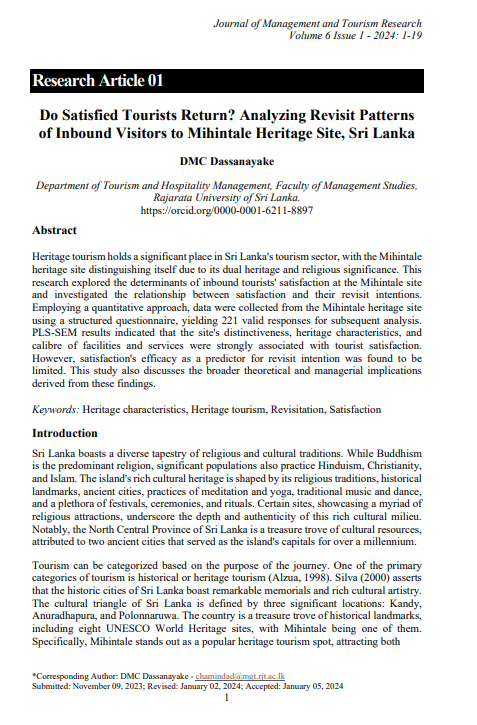Volume 06, Issue 01
TABLE OF CONTENTS
01. Do Satisfied Tourists Return? Analyzing Revisit Patterns of Inbound Visitors to Mihintale Heritage Site, Sri Lanka
DMC Dassanayake
INFORMATION
Journal Title: Journal of Management and Tourism Research
Volume : 6 Issue : 01
Page : 1- 18
DMC Dassanayake
Department of Tourism and Hospitality Management, Faculty of Management Studies, Rajarata University of Sri Lanka.
ABSTRACT
Heritage tourism holds a significant place in Sri Lanka’s tourism sector, with the Mihintale heritage site distinguishing itself due to its dual heritage and religious significance. This research explored the determinants of inbound tourists’ satisfaction at the Mihintale site and investigated the relationship between satisfaction and their revisit intentions. Employing a quantitative approach, data were collected from the Mihintale heritage site using a structured questionnaire, yielding 221 valid responses for subsequent analysis. PLS-SEM results indicated that the site’s distinctiveness, heritage characteristics, and calibre of facilities and services were strongly associated with tourist satisfaction. However, satisfaction’s efficacy as a predictor for revisit intention was found to be limited. This study also discusses the broader theoretical and managerial implications derived from these findings.
Key Words : Heritage characteristics, Heritage tourism, Revisitation, Satisfaction
02. Student Engagement in Teaching and Learning Environment: Evidence from Sri Lanka
S. Chandramohan1 , A. Jayamaha2 , K. Yatigammana3
INFORMATION
Journal Title: Journal of Management and Tourism Research
Volume : 6 Issue : 01
Page : 19 – 39
S. Chandramohan1 , A. Jayamaha2 , K. Yatigammana3
1Faculty of Graduate Studies, University of Kelaniya, Sri Lanka
2,3Faculty of Graduate Studies, University of Kelaniya Sri Lanka
1https://orcid.org/0009-0004-9500-9784
2https://orcid.org/0009-0004-3257-7610
3https://orcid.org/0000-0002-8057-8632
ABSTRACT
The challenges faced by higher education institutions globally, particularly in Sri Lanka, regarding student satisfaction, retention, and employability are exacerbated by the recent global pandemic and economic crisis. The study focuses on factors within the universities’ control, emphasizing the importance of student engagement as recommended by academic investigations. Using Astin’s Theory of Involvement, combined with ecological system theory and teaching and learning environment models, the research explores the influences on student engagement, including the moderating role of technology. The literature review underscores the significance of teaching, student-peer relationships, teacher-student relationships, and campus and institutional environment. Employing a deductive approach, the study includes both state and nonstate university students in the sample, revealing positive relationships between these variables and student engagement in the Sri Lankan context. Ultimately, the research contributes a comprehensive model to understand and enhance student engagement in Sri Lankan higher education. Further research in this area could focus on several key aspects to address the limitations and expand our understanding of effective strategies for promoting student engagement in higher education. Further, empirical studies are needed to evaluate the effectiveness of the proposed practical implications in diverse institutional settings. Researchers could conduct longitudinal studies or quasi-experimental designs to assess the impact of implementing these strategies on student engagement, learning outcomes, and overall academic success. Such studies would provide valuable insights into the scalability and generalizability of the proposed interventions.
Keywords: Education technology, student engagement, teaching and learning environment
03. Ownership Structure and Firm Performance with Moderating Role of Financing Decisions: Evidence from Listed Companies in Sri Lanka
Balagobei, S1 , Subramaniam, V.A2 , and Saseela Balagobei3
INFORMATION
Journal Title: Journal of Management and Tourism Research
Volume : 6 Issue : 01
Page : 41- 56
S. Chandramohan1 , A. Jayamaha2 , K. Yatigammana3
1,2,3Faculty of Management Studies and Commerce, University of Jaffna, Sri Lanka
1https://orcid.org/0009-0009-0853-7834
2https://orcid.org/0009-0009-7788-9024
13https://orcid.org/0000-0001-6275-2310
ABSTRACT
The aim of this study is to examine the impact of ownership structure on the firm performance of listed companies in Sri Lanka. This investigation also intends to examine the moderating effect of financing decisions on the relationship between the ownership structure and the firm performance. This study was confined to listed companies using a sample of 100 companies in Sri Lanka with 900 firm-year observations from 2013 to 2021. Quantitative method and deductive approach were employed. Data were collected from the audited annual financial statements of the listed firms in CSE. The statistical techniques of Pearson’s correlation and panel data regression were used to analyze the association between the ownership structure and the firm performance.The findings of this study reveal that managerial ownership has a positive impact on the firm performance in terms of return on assets. Furthermore, financing decisions have a direct negative impact on return on assets and it moderates the nexus between institutional ownership and return on assets. When the firm’s debt level decreases, the effect of institutional ownership on return on assets will be more favourable to the listed companies. Similarly, financing decisions moderate the nexus between managerial ownership and return on assets. The coefficient of interaction affirms a negative and statistically significant effect of the interaction between financing decisions and managerial ownership. Moreover, it is found that financing decisions moderates negatively the nexus between foreign ownership and Tobin’s Q.The study recommends that the companies can use the less level of debt because it decreases the performance of companies in Sri Lanka. They should rely more on their internal source of finance. Furthermore, it is suggested that the listed firms may focus on prudent debt management and engage carefully in evaluating and controlling their debt levels to avoid adverse effects on performance. The firms can issue the shares to managers as it helps to reduce the agency cost and increase the firm performance. This study has broad and comprehensive practical implications which are beneficial for policymakers.
Keywords: Firm performance, Foreign ownership, Institutional ownership, Managerial ownership, Ownership concentration
04. Impact of Work-Family Conflict on Women’s Career Development with the Moderating Role of Perceived Supervisor Support
K.A.S.M Sammani1 , V. M. Gunasekara2
INFORMATION
Journal Title: Journal of Management and Tourism Research
Volume : 6 Issue : 01
Page : 57- 70
K.A.S.M Sammani1 , V. M. Gunasekara2
1,2 Department of Human Resource Management, Faculty of Commerce and Management Studies, University of Kelaniya, Sri Lanka
1 https://orcid.org/0009-0009-1319-7184
2 https://orcid.org/0000-0001-9348-6158
ABSTRACT
The main purpose of this study is to examine the impact of work-family conflict on women’s career development of senior executive and above-level female employees in the insurance sector in the Colombo district, Sri Lanka. This was carried out as a cross sectional field study among a sample of 136 senior executive and above-level employees in the insurance sector in the Colombo district, Sri Lanka. Simple random sampling was applied to select the sample. Primary data was collected through a standard questionnaire as a Google form via online mode through survey. The collected data were analyzed with the support of the SPSS employing regression, correlation, and descriptive statistics. Further, work-family conflict acts as the independent variable, women’s career development acts as the dependent variable and perceived supervisory support acts as the moderator. While work-family conflict is evaluated using indicators such as work-to-family conflict and family-to-work conflict. Women’s career development is evaluated using the indication of career goal process, professional ability development, promotion speed, and re muneration growth. The finding discovered that work-family conflict was a reason for the poor career development of female employees in the insurance sector and also this was significantly impacted by the moderator, perceived supervisor support. It is recommended that the insurance sector take necessary actions to develop the careers of female employ ees while reducing their work-family conflict.
Keywords: Insurance sector, perceived supervisor support, women’s career development, work-family conflict
05. Can financial literacy make a difference in individual investors’ exposure to herd bias? Evidence from the Colombo Stock Exchange of Sri Lanka
K.V.A. Shantha
INFORMATION
Journal Title: Journal of Management and Tourism Research
Volume : 6 Issue : 01
Page : 71- 84
K.V.A. Shantha
Department of Accounting and Finance, Faculty of Management Studies, The Open University of Sri Lanka, Nawala, Nugegoda, Sri Lanka.
https://orcid.org/0000-0001-8773-1225
ABSTRACT
This study attempts to explore the relatively under-explored issue of how individual investors can mitigate herd bias that occurs when trading stocks. Although financial literacy is recognized in the literature as a potential mitigator of herd bias, the underlying cognitive and psychological mechanisms that integrate with financial literacy to reduce herd bias remain unclear. Based on the literature on cognitive psychology and behavioral finance, the study hypothesizes that investors can mitigate their herd bias by engaging in self-reflection on their past stock trading experiences, and their financial literacy plays a moderating role in this self-reflection effect. The data is collected through a self administered questionnaire from 253 active individual investors at the Colombo Stock Exchange of Sri Lanka. The partial least square structural equation modelling technique was applied to analyze the survey data and test the hypotheses of the study. The results show that self-reflection has a large significant effect on reducing herd bias. The self reflection improves largely with investors’ desire for learning, while small improvements from their investment experience and interactions with advisors. The moderation analysis reveals that the effect of self-reflection on reducing herd bias is stronger at lower financial literacy than at higher financial literacy. It indicates that low financially literate investors are more prone to herd due to lack of financial literacy, however self-reflection helps them to recognize pitfalls of herding, thereby reducing their herd bias to a greater extent. Accordingly, the study concludes that individual investors can mitigate their herd bias by engaging in self-reflection which empowers them to be more financially literate to mitigate their herd bias. Based on these findings, this study outlines practical implications for individual investors and financial practitioners.
Keywords: Colombo stock exchange, financial literacy, herd bias, investor education, intuitive thinking, self-reflection
06. The Impact of Political Instability on Work Performance in the Sri Lankan Hotel Industry: Mediator Role of Income Level
D.K.T Dangalla1, C. Prabuddha2
INFORMATION
Journal Title: Journal of Management and Tourism Research
Volume : 6 Issue : 01
Page : 85- 104
D.K.T Dangalla1, C. Prabuddha2
1,2 Department of Tourism Studies, Uva Wellassa University, Badulla, Sri Lanka
1https://orcid.org/0009-0006-3325-7277
2https://orcid.org/0009-0004-7726-6453
ABSTRACT
This study examines the complex relationship between political instability, work performance and income level in Sri Lanka’s prestigious four-star and five-star hotel industry. Researchers believe that periods of political unrest can have a negative impact on employee performance, leading to decreased productivity, lower morale and increased absenteeism. However, they further theorize that this negative effect may be less for workers with higher income levels. To test these hypotheses, researchers employed a quantitative research design, distributing a purposive online survey to a sample of 384 hotel employees. The survey instrument included multi-item scales to capture nuances of political instability, income levels and work performance, and accounted for participant demographics such as sex, age and work experience. This analysis yielded results that confirmed their initial hypotheses. A negative relationship emerged between political instability and job quality, suggesting that periods of political turmoil may actually hinder employee performance in the Sri Lankan hotel industry. Interestingly, the data revealed a moderating effect of income. This suggests that higher income levels can act as a buffer, partially mitigating the negative effects of political instability on work performance. This finding underscores the importance of both economic security and employee well-being during times of political unrest. To strengthen employee resilience and mitigate the negative effects of political instability on the hotel industry, the study recommends implementing targeted policy interventions. These interventions can include financial assistance programs to help workers overcome economic hardship during periods of political turmoil, as well as resilience training programs to equip workers with the coping mechanisms needed to navigate challenging political environments.
Keywords: Political instability, employee performance, income level, hotel industry, tourism



